unit 8大学英语精读 PPT
- 格式:ppt
- 大小:448.50 KB
- 文档页数:34
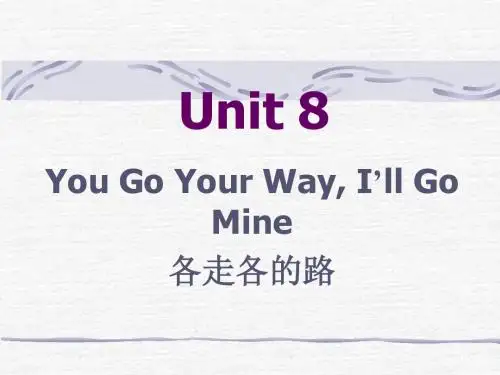
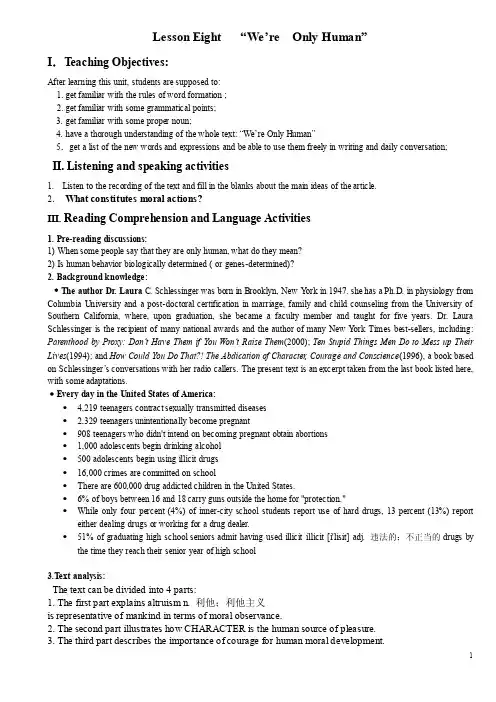
Lesson Eight “We’re Only Human”I.T eaching Objectives:After learning this unit, students are supposed to:1. get familiar with the rules of word formation ;2. get familiar with some grammatical points;3. get familiar with some proper noun;4. have a thorough understanding of the whole text: “We’re Only Human”5.get a list of the new words and expressions and be able to use them freely in writing and daily conversation;II.Listening and speaking activities1.Listen to the recording of the text and fill in the blanks about the main ideas of the article.2.What constitutes moral actions?III. Reading Comprehension and Language Activities1. Pre-reading discussions:1) When some people say that they are only human, what do they mean?2) Is human behavior biologically determined ( or genes-determined)?2. Background knowledge:﹡The author Dr. Laura C. Schlessinger was born in Brooklyn, New Y ork in 1947. she has a Ph.D. in physiology from Columbia University and a post-doctoral certification in marriage, family and child counseling from the University of Southern California, where, upon graduation, she became a faculty member and taught for five years. Dr. Laura Schlessinger is the recipient of many national awards and the author of many New Y ork Times best-sellers, including: Parenthood by Proxy: Don’t Have Them if You Won’t Raise Them(2000); Ten Stupid Things Men Do to Mess up Their Lives(1994); and How Could You Do That?!The Abdication of Character, Courage and Conscience(1996), a book based on Schlessinger’s conversations with her radio callers. The present text is an excerpt taken from the last book listed here, with some adaptations.﹡Every day in the United States of America:•4,219 teenagers contract sexually transmitted diseases•2,329 teenagers unintentionally become pregnant•908 teenagers who didn't intend on becoming pregnant obtain abortions•1,000 adolescents begin drinking alcohol•500 adolescents begin using illicit drugs•16,000 crimes are committed on school•There are 600,000 drug addicted children in the United States.•6% of boys between 16 and 18 carry guns outside the home for "protection."•While only four percent (4%) of inner-city school students report use of hard drugs, 13 percent (13%) report either dealing drugs or working for a drug dealer.•51% of graduating high school seniors admit having used illicit illicit [i'lisit] adj. 违法的;不正当的drugs by the time they reach their senior year of high school3.T ext analysis:The text can be divided into 4 parts:1. The first part explains altruism n. 利他;利他主义is representative of mankind in terms of moral observance.2. The second part illustrates how CHARACTER is the human source of pleasure.3. The third part describes the importance of courage for human moral development.4. The fourth part profoundly and comprehensively explains how conscience works in human morality. 4. Language points:1)Vocabulary(1). bachelor party(AmE) a party for men only, esp the night before a man’s wedding.(2). vegetable: someone who can not think or move because their brain is damaged.(3). to get in the way: to prevent somebody from doing sth(4)blueprint: (technical)the pattern in every living cell, which decides how the plant, animal or person will develop and how it will look like.(5)leap of faith: a belief or trust in something intangible or incapable of being proved, e.g.It requires a leap of faith to pursue this unusual step of transplanting an animal heart into a human patient.(6)at the expense of: with some harm done to,We have been developing our economy at the expense of our environment.It is unwise to increase production at the expense of quality.(7)to come in: to be involvedEverybody has a part to play, where do I come in?I don’t understand. It seems to be a very practical problem. Where does social responsibility come in?2)Grammatical points and structure﹡Be elevated(p2): achieve a more important rank or status•Be elevated to the post of chancellor•Emotional stress can elevate blood pressure.(to increase in amount, significance or intensity)•Elevate pop singers to idols (consider it to be more important than it really is)﹡Drive(p6): a strong need or desire ; energy and determination•n. 车道=driveway•I thought we might go for a drive.兜风•disk drive•Rescuers battling through driving snow迎面扑来的劲雪•China’s early intellectuals with background of oversea education played a major role in our nation’s drive toward democracy.(a special effort made by a group of people)﹡Derive(p7): derive pleasure or benefit from sth or sb•He is one of those happy people who derive pleasure from helping others.•Defensive behavior patterns derive from our subconscious fears. (A word or feeling derives from / is derived from)﹡Forge(p8)•~ an alliance or relationship (create it through hard work and hope it to be lasting and strong)•~ sth (achieve sth difficult): prisons often help inmates forge new careers.•~ passport, banknote, document, painting, signature, etc. 伪造•~ a blade 铸剑﹡Honor(p10)•授予Two American surgeons were last week ~ed with the Nobel Prize.•荣幸It’s my ~ to have your/ I’m ~ed by your confidence in me.•信守The two sides agreed to ~ a ceasefire.•庆祝City Bank is holding a dinner in ~ of the opening of their new branch in Shanghai.•感谢President Bush will attend a concert in his ~ / in ~ of firefighters.﹡Commitment(p): a strong belief in an idea or system; 责任;承诺•~ to the ideals of Bolshevism•Work ~s forced her to uproot herself from V ancouver.•They made a ~ to nuclear nonproliferation.commit a crime or a sin;commit suicidebe ~ted to sth致力于The government ~ted billions of dollars for a program to reduce acid rain.(use specially专门用于)Think twice before you ~ yourself to working Sundays.(decide to do)It isn’t their diplomatic style to ~ themselves on such a delicate issue. (say what you real ly think or want to do表态) ﹡If I could project you fifteen years into the future (p14): to device in the mindProject one’s country oversea向海外介绍自己的国家----He projected the weather for the coming week. 预测下个星期的天气----The wall is projected in the middle.设计----A politician must project himself as a reformer if he wants to win an election.Project oneself as 营造自己形象project slides onto a screen 放幻灯片Project a new dam/carry out a project﹡Sustain(p17)•~ the weight / the extra expenses承受An unshakable faith ~ me.支持•~ public interest/ the product’s quality~ a family / life 养家,维持•~ hardships / the shock / comparison经受•~ a defeat / a loss蒙受Sustainable growth可持续增长•Sustained illness/attacks 久病;持续进攻﹡Initiative(p17)have/seize the initiative e.g.He did not have the initiative to start his own business.(掌握主动权)on one’s own initiative e.g He went to see the headmaster in his own initiative.(主动地)take the initiative e.g Why don’t you take the initiative and arrange a meeting? (带头)do sth. on one's own initiative 主动地做某事﹡Courage is to life what broth is to soup. (simile)Carlos Lehder was to cocaine transportation what / as Henry Ford was to cars.﹡Conform to(p22)•The meat market can continue only if it is radically overhauled全面检查to conform with/to strict EU standards.(to meet the rules or the desired quality)•I am well aware that we all conform to one stereotype or another. (very similar to)•In conformity with a law or regulation or sb’s wishes根据,符合﹡Adam and Eve•Adam from ea rth, and Eve from Adam’s rib, The Garden of Eden•The temptation of the serpent•The fall of man, the original sin•The expulsion of Adam and Eve from Eden•Fulfill vows of penance﹡Devastating(p25): very destructive•Affairs do have a devastating effect on marriage.•He returned to his best with a devastating display of galloping and jumping. (very impressive)•A few days before, a fire had devastated part of Windsor Castle.﹡T ransitory(p26): lasting only for a short time•Most teenage romances are transitory.•Temporary: lasting for only a limited time•Most adolescent problems are temporary﹡Metonymy (借代)与Metaphor (隐喻)的区别•隐喻是不同类事物的比拟(comparing materials across domains),借代是同一类事物的比拟(comparingmaterials within domains)。
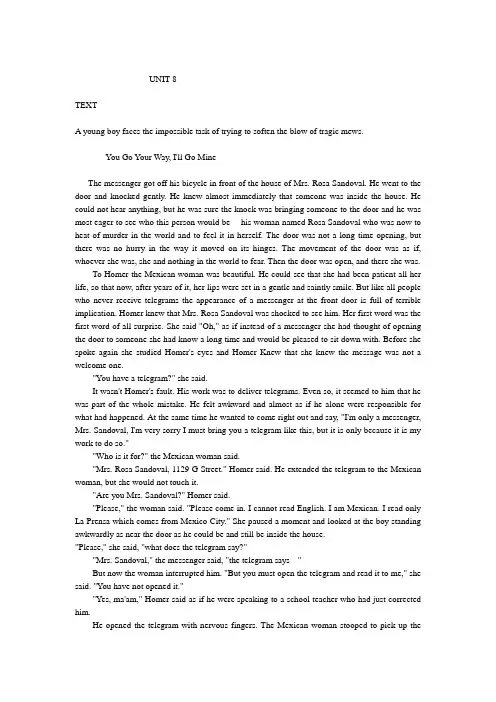
UNIT 8TEXTA young boy faces the impossible task of trying to soften the blow of tragic mews.You Go Your Way, I'll Go MineThe messenger got off his bicycle in front of the house of Mrs. Rosa Sandoval. He went to the door and knocked gently. He knew almost immediately that someone was inside the house. He could not hear anything, but he was sure the knock was bringing someone to the door and he was most eager to see who this person would be -- his woman named Rosa Sandoval who was now to heat of murder in the world and to feel it in herself. The door was not a long time opening, but there was no hurry in the way it moved on its hinges. The movement of the door was as if, whoever she was, she and nothing in the world to fear. Then the door was open, and there she was.To Homer the Mexican woman was beautiful. He could see that she had been patient all her life, so that now, after years of it, her lips were set in a gentle and saintly smile. But like all people who never receive telegrams the appearance of a messenger at the front door is full of terrible implication. Homer knew that Mrs. Rosa Sandoval was shocked to see him. Her first word was the first word of all surprise. She said "Oh," as if instead of a messenger she had thought of opening the door to someone she had know a long time and would be pleased to sit down with. Before she spoke again she studied Homer's eyes and Homer Knew that she knew the message was not a welcome one."You have a telegram?" she said.It wasn't Homer's fault. His work was to deliver telegrams. Even so, it seemed to him that he was part of the whole mistake. He felt awkward and almost as if he alone were responsible for what had happened. At the same time he wanted to come right out and say, "I'm only a messenger, Mrs. Sandoval, I'm very sorry I must bring you a telegram like this, but it is only because it is my work to do so.""Who is it for?" the Mexican woman said."Mrs. Rosa Sandoval, 1129 G Street." Homer said. He extended the telegram to the Mexican woman, but she would not touch it."Are you Mrs. Sandoval?" Homer said."Please," the woman said. "Please come in. I cannot read English. I am Mexican. I read only La Prensa which comes from Mexico City." She paused a moment and looked at the boy standing awkwardly as near the door as he could be and still be inside the house."Please," she said, "what does the telegram say?""Mrs. Sandoval," the messenger said, "the telegram says --"But now the woman interrupted him. "But you must open the telegram and read it to me," she said. "You have not opened it.""Yes, ma'am," Homer said as if he were speaking to a school teacher who had just corrected him.He opened the telegram with nervous fingers. The Mexican woman stooped to pick up thetorn envelope, and tried to smooth it out. As she did so she said, "Who sent the telegram -- my son Juan Domingo?""No, ma'am." Homer said. "The telegram is from the War Department.""War Department?" the Mexican woman said."Mrs. Sandoval," Homer said swiftly, "your son is dead. Maybe it's a mistake, Everybody makes a mistake, Mrs. Sandoval. Maybe it wasn't your son. Maybe it was somebody else. The telegram says it was Juan Domingo. But maybe the telegram is wrong,"The Mexican woman pretended not to hear."Oh, do not be afraid," she said. "Come inside. Come inside. I will bring you candy." She took the boy's arm and brought him to the table at the center of the room and there she made him sit."All boys like candy," she said. "I will bring you candy." She went into another room and soon returned with an old chocolate candy box. She opened the box at the table and in it Homer saw a strange kind of candy."Here," she said. "Eat this candy. All boys like candy."Homer took a piece of the candy from the box, put it into his mouth, and tried to chew."You would not bring me a bad telegram," she said. "You are a good boy -- like my little Juanito when he was a little boy. Eat another piece." And she made the messenger take another piece of the candy.Homer sat chewing the dry candy while the Mexican woman talked. "It is our own candy," she said, "from cactus. I made it for my Juanito when he come home, but you eat it. You are my boy, too."Now suddenly she began to sob, holding herself in as if weeping were a disgrace. Homer wanted to get up and run, but he knew he would stay. He even thought he might stay the rest of his life. He just didn't know what else to do to try to make the woman less unhappy, and if she had asked him to take the place of her son, he would not have been able to refuse, because he would not have known how. He got to his feet, as if by standing he meant to begin correcting what could not be corrected and then he knew the foolishness of this intention and became more awkward than ever. In his heart he was saying over and over again, "What can I do? What the hell can I do? I'm only the messenger."NEW WORDSsoftenv. (cause to) become soft(er) or gentle (使)软化;(使)温和tragica. very sad, unfortunate; of or related to tragedy 悲惨的;悲剧的messengern. a person employed to deliver telegrams, letters or parcels 送信人,电报投递员gentlyad. softly 轻轻地immediatelya. at onceimmediatea.eagera. marked by strong interest or impatient desire 热切的,渴望的hingen. 铰链whoeverpron. no matter who 无论谁,不管谁saintlya. like a saint; very holy 像圣徒一样的;圣洁的implicationn. 含义implyvt.shockvt. cause unpleasant or angry surprise to (sb.) 使(某人)震惊delivervt. take (sth.) to the place where it esp. sth. bad 交付,递送awkwarda. uncomfortable 尴尬的responsiblea. having done or been the cause of esp. sth. bad(应)负责的Mexicann & a. 墨西哥人;墨西哥(人)的extendvt. hold out 伸出pausevi. stop for a short time暂停,中止interruptvt. stop (sb. speaking) by breaking in 打断(某人讲话)nervousa. 神经质的;紧张的ma'ammadam (used in direct address)夫人,太太,小姐smoothvt. make smooth or smoother把...弄平departmentn. 部门;系swiftlyad. rapidly, quickly快速地;敏捷地swifta.chocolaten. 巧克力(糖)chewvt. crush (food) with the teeth 咀嚼cactusn. 仙人掌sobvi. cry with short, quick breaths 啜泣;呜咽disgracen. shame 耻辱;丢脸的人(或事)unhappya. not happyhelln. 地狱PHRASES & EXPRESSIONShear ofhave knowledge of or receive information about 听到,听说be responsible forbe the cause of 应对...负责的come out (with)speak out 大声地说,清楚地说smooth outmake smooth(er)hold oneself incontrol one's feelingstake the place ofact or be used instead of, replace 代替,取代get to one's feelstand upover and over againvery often, repeatedly 反复地,再三地PROPER NAMESRosa Sandoval罗莎.桑多瓦尔Homer霍默Mexico City墨西哥城(墨西哥首都)Juan Domingo胡安多明哥the War Department(美国)陆军部(旧称)Juanito胡安尼特(Juan的昵称)。

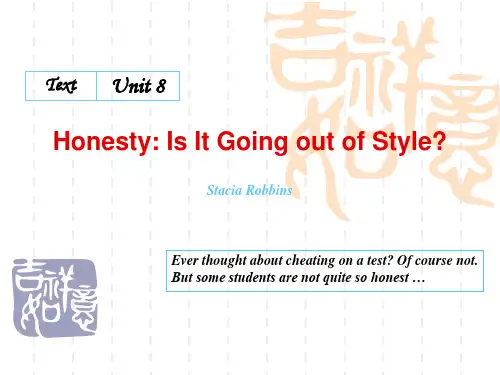
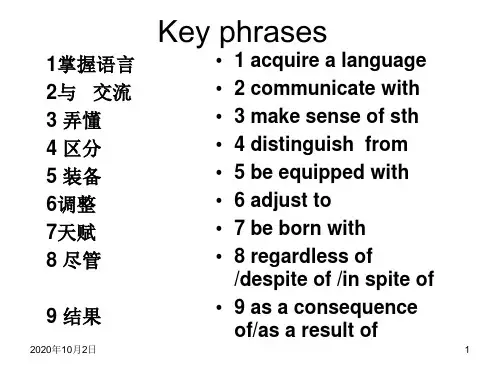



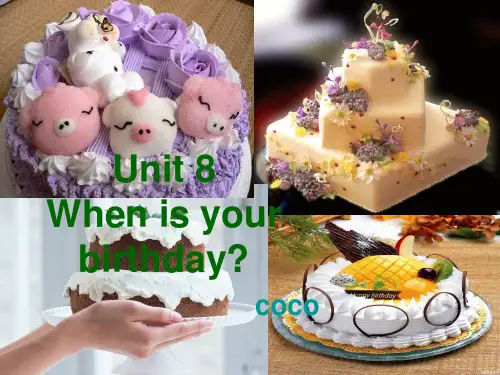

⼤学英语精读第⼀册unit8UNIT 8TEXTThe boy was at first delighted to discover the present his mother had hidden away as his Christmas gift. But then he began to worry that his mother would now no longer have the pleasure of giving him a surprise. What was he to do?A Magician at Stretching a DollarThat December, with Christmas approaching, she was out at work and Doris was in the kitchen when I let myself into her bedroom one afternoon in search of a safety pin. Since her bedroom opened onto a community hallway, she kept the door locked, but needing the pin, I took the key from its hiding place, unlocked the door and stepped in. Standing against the wall was a big, black bicycle with balloon tires. I recognized it instantly. It was the same second-hand bike I’d been admiring in a Baltimore Street shop window. I’d even asked about the price. It was a shock. Something like $15. Somehow my mother had scraped together enough for a down payment and meant to surprise me with the bicycle on Christmas morning.I was deeply moved by the discovery and yet sickened by the knowledge that, bursting into her room like this, I had robbed her of the pleasure of seeing me astonished and delighted on Christmas day. I hadn’t wanted to know her lovely secret; still coming upon it like this made me feel as though I’d struck a blow against her happiness. I backed out, put the key back in its hiding place, and thought over what to do.I decided that between now and Christmas I must do nothing, absolutely nothing, to reveal the slightest hint of my terrible knowledge. I must avoid the least word that might reveal my possession of her secret. Nothing must deny her the happiness of seeing me completely amazed on Christmas day.In the privacy of my bedroom I began composing and testing exclamations of delight: “Wow!” “A bike with balloon tires! I don’t believe it!” “I’m the luckiest boy alive!” And so on. They all owed a lot to movies in which boys like Mickey Rooney had seen their wildest dreams come true. I soon realized that, with my lack of acting talent, all of them were going to sound false at the critical moment when I wanted to cry out my love spontaneously from the heart. Maybe it would be better to say nothing but appear to be shocked into such deep pleasure that speech had escaped me. I wasn’t sure, though. I’d seen speechless gratitude in the movies too, and it never really worked until the actors managed to cry a few quiet tears. I doubted I could cry on cue, so I began thinking about other expressions of speechless amazement. In front of a hand-held mirror in my bedroom I tried the whole range of expressions; mouth open and eyes wide; hands slapped firmly against both cheeks to keep the jaw from falling off; ear-to-ear grin with all teeth fully exposed while hugging myself with both arms. These and more I practiced for several days without acquiring confidence in any of them. I decided to wait until Christmas morning and see if anything came naturally…That Christmas morning she woke us early, “to see what Santa Claus brought,” she said with just the right tone of voice to indicate we were all old enough to know who Santa Claus was. I came out of my bedroom with my present for her and Doris, and Doris came with hers. My mother’s has been placed under the tree during the night. There were a few small brightly wrapped packages, a big doll for Doris, but no bicycle. I must have looked disappointed.“It looks like Santa Claus didn’t do too well by you this year, Buddy,” she said, as I opened packages. A shirt. A necktie. I said something halfhearted like, “It’s the thought that counts,” but what I felt was bitter disappointment. I supposed she’d found the bike just too expensive and sent it back.“Wait a minute!” she cried, snapping her fingers. “There’s something in my bedroom I forgot all about.”She went out, and a moment later came back wheeling the big black two-wheeler with balloon tires. I didn’t have to pretend, after all. The three of us—Doris, my mother, and I—were people bred to hold back emotional expressions of love, but I did something that startled both my mother and me. I threw my arms around her spontaneously and kissed her.“All right now, don’t carry on about it. It’s only a bicycle,” she said.Still, I knew that she was as happy as I was to see her so happy.NEW WORDS1、magician n./magic n.2、stretch v.3、approach v.4、community n.5、hallway n.1、person with magical powers巫师,魔术师/魔术2、节俭地使⽤,(使)变长(或宽),拉长3、come near or nearer to (sb./sth.)in space or time接近,临近4、社区5、过道,门厅6、balloon n.7、instantly ad./instant a.8、second-hand a.9、somehow ad.10、scrape vt.6、⽓球7、at once,immediately⽴即8、⼆⼿的,旧的9、in some way,by some means 10、以某种⽅式,不知为什么11、scrape vt.(→形近script n. 脚本;⼿迹;书写⽤的字母/vt. 把…改编为剧本/vi. 写电影脚本) eg.scrape together12、payment n. eg.down payment13、sicken vt.14、rob vt. eg.rob(sb.)of(sth.)15、astonish vt.11、刮,擦 eg.gather or collect(sth.)with difficulty积攒,拼凑 12、⽀付,付款,⽀付的款项 eg.⾸付款,头款 13、make (sb.) feel disgusted使厌恶 14、剥夺,抢劫 eg.剥夺,抢劫 15、surprise greatly使⼤为惊讶16、absolutely ad./absolute a.17、reveal vt.18、slight a.19、hint n.20、avoid vt.16、completely and totally完全地,绝对地 17、泄漏,使显露 18、not serious or important,small⽆⾜轻重的,轻微的 19、small indication(n. 指⽰,指出;迹象;象征),indirect suggestion些微的迹象,暗⽰ 20、prevent (sth.) from happening,stop oneself from (doing sth.)避免,防⽌21、deny vt.22、privacy n./private a.23、compose vt.24、exclamation n.25、wow interj.21、refuse to give (sb.) from having (sth.),say that (sth.) is not true拒绝给予,否认 22、独处,不受⼲扰,隐私/私⼈的,个⼈的 23、write (a letter,speech,etc.) with great care and thought,write (music,opera,poetry,etc.)赚些,创作 24、感叹,惊叫25、expressing great surprise,pain,etc.感叹,惊叫26、lucky a.27、talent n.28、critical a.29、spontaneously ad./spontaneous a.30、gratitude n.26、幸运的 27、(people with) a special or very great skill or ability天才 28、危急的,决定性的,关键的 29、happening in a natural way without being planned or thought about⾃发地,⾃然地 30、感激之情,感恩之⼼31、cue n. eg.on cue32、hand-held a.33、mirror n.34、range n.35、slap vt.31、a few words or action that gives sb. the signal to say or do sth.提⽰,暗⽰ eg.at exactly the right or expected moment恰好在这个时候 32、⼿持的,⼿提式的 33、镜⼦ 34、⼀系列,⼀排,范围 35、啪地⼀声放(或扔等),打36、jaw n.37、ear-to-ear a.38、grin n./vi.39、expose vt.40、hug vt./n. eg.hug oneself36、颚,下巴 37、合不拢嘴的,满⾯的 38、wide smile咧嘴笑,露齿的笑 39、暴露,使⽆遮盖(或保护) 40、拥抱,紧抱eg.双臂在胸前交叉抱⾝41、acquire vt.42、confidence n.43、naturally ad.44、tone n.45、indicate vt./indication n.41、gradually develop or learn,obtain习得,获得 42、信⼼,把握,⾃信 43、in a natural manner⾃然地 44、声调,⼝⽓45、show, be a sign of表明,象征46、wrap n.47、doll n.48、buddy n.49、necktie n.50、halfheared a.46、cover or enclose(sth.)in paper,plastic,etc.包,裹 47、玩具娃娃 48、伙计,⽼弟,⽼兄 49、领带 50、done with no real interest or enthusiasm(n. 热⼼,热忱,热情)半⼼半意的,不热⼼的51、snap v. eg.snap one's fingers52、two-wheeler n.53、breed v.54、startle vt.51、使劈啪作响,(使)折断 eg.捻⼿指 52、bicycle or motorcycle⾃⾏车,摩托车 53、养育,培养,繁殖 54、give a sudden shock or surprise to使⼤吃⼀惊,惊动PHEASES & EXPRESSIONS55、in search of56、something like57、come upon58、think over59、come true60、do well by61、hold back55、looking for寻找 56、approximately,about⼤约,⼤概 57、meet(sb.)or find(sth.)by chance偶然遇见(或发现) 58、认真考虑 59、实现,成真 60、tread(sb.)well对(某⼈)好 61、control or restrain(vt. 抑制,控制;约束;制⽌)抑制,控制PROPER NAMESRussell Baker 拉塞尔.贝克(1925-,美国幽默专栏作家)Doris 多丽丝(⼥⼦名)Baltimore Street 巴尔的摩⼤街Mickey Rooney⽶基.鲁尼(1920—,美国电影演员,1937-1946年在系列影⽚“家事”中塑造了⼩镇少年Andy Hardy这⼀令⼈难忘的⾓⾊)Santa Claus 圣诞⽼⼈。